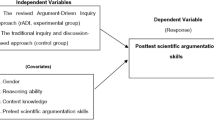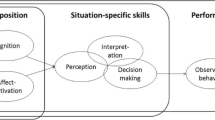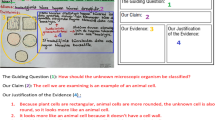Abstract
This quasi-experimental mixed-methods design examined the effects of a Modified Argument-Driven Inquiry (MADI) on elementary school boys’ and girls’ engagement in learning science (ELS) and performance of argumentation. Thirty-two children were randomly selected to participate in a two-semester 24-h intervention, forming an experimental group (EG, 13 boys, 19 girls); another 36 children were also randomly selected from the same two schools as a comparison group (CG, 20 boys, 16 girls). All participants completed pretest and posttest at the beginning and 1 month after each semester’s intervention. A well-structured student questionnaire was used to assess the participants’ ELS and quality of argumentation. In addition, four target children with the highest or the lowest scores on pretest were purposively recruited for weekly classroom observations and two-wave interviews for triangulation and consolidation of quantitative findings. The results from the repeated measures ANOVA revealed that the EG boys and girls made significant and continuous improvement in the quality of argumentation from the first to the second semesters. In contrast, the CG girls presented significantly lower scores than the boy counterparts. In addition, the results of the ANCOVA measures indicated that the EG girls of high engagement made a significant improvement in the quality of argumentation than the girls of low engagement. This study provides a fresh insight to support the use of a MADI intervention as an effective strategy for improving girls’ continuous ELS and high quality of argumentation.
Similar content being viewed by others
References
Adodo, S. O., & Gbore, L. O. (2012). Prediction of attitude and interest of science students of different ability on their academic performance in basic science. International Journal of Psychology and Counseling, 4(6), 68–72. https://doi.org/10.5897/IJPC10.049.
Allport, G. W. (1954). The nature of prejudice. Cambridge, England: Addison-Wesley.
Asterhan, C. S. C., Schwarz, B. B., & Gil, J. (2012). Small-group, computer-mediated argumentation in middle-school classrooms: The effects of gender and different types of online teacher guidance. British Journal of Educational Psychology, 82, 375–397. https://doi.org/10.1111/j.2044-8279.2011.02030.x.
Bacchini, D., & Magliulo, F. (2003). Self-image and perceived self-efficacy during adolescence. Journal of Youth and Adolescence, 32(5), 337–349. https://doi.org/10.1023/A:1024969914672.
Barmby, P., Kind, P. M., & Jones, K. (2008). Examining changing attitudes in secondary school science. International Journal of Science Education, 30(8), 1075–1093. https://doi.org/10.1080/09500690701344966.
Brislin, R. W. (1986). The wording and translation of research instrument. In W. J. Lonner & J. W. Berry (Eds.), Field methods in cross-cultural research (pp. 137–164). Beverly Hills, CA: Sage Publications.
Ceci, S. J., & Willliams, W. M. (2011). Understanding current causes of women’s underrepresentation in science. Proceedings of the National Academy of Sciences, 108(8), 3157–3162. https://doi.org/10.1073/pnas.1103900108.
Chen, W.-C., Ku, C.-H., Hsu, Y.-S., & Yang, W.-G. (2011). The application of a concept cartoon argumentation strategy to enhance children's argumentation ability. Chinese Journal of Science Education, 19(1), 69–99. https://doi.org/10.6173/CJSE.2011.1901.04.
Chen, H-T., Wang, H-H., Lin, H. S., Lawrenz, F., & Hong, Z. R. (2014). Longitudinal study of an inquiry-based science camp on low-achieving children’s affective perceptions of learning science and positive thinking. International Journal of Science Education, 36(13), 2133–2156.
Chen, H-T., Wang, H-H., Lu, Y.-Y., Lin, H-S., & Hong, Z. R. (2016). Using a modified argument-driven inquiry to promote elementary school students’ engagement in learning science and argumentation. International Journal of Science Education, 38(2), 170–191.
Chin, C. C., Yang, W.-C., & Tuan, H.-L. (2016). Argumentation in a socioscientific context and its influence on fundamental and derived science literacies. International Journal of Science and Mathematics Education, 14(4), 603–617. https://doi.org/10.1007/s10763-014-9606-1.
Chowning, J. T., Griswold, J. C., Kovarik, D. N., & Collins, L. J. (2012). Fostering critical thinking, reasoning, and argumentation skills through bioethics education. PLoS One, 7(5), e36791. https://doi.org/10.1371/journal.pone.0036791.
Cohen, J. (1988). Statistical power analysis for the behavioral sciences (2nd ed.). Hillsdale, MI: Lawrence Erlbaum.
Creswell, J. W., & Plano Clark, V. (2007). Designing and conducting mixed methods research. Thousand Oaks, CA: Sage.
Drissen, G., & van Langen, A. (2013). Gender differences in primary and secondary education: Are girls really outperforming boys? International Review of Education, 59(1), 67–86. https://doi.org/10.1007/s11159-013-9352-6.
Ezeh, D. N. (2013). Science without women: A paradox. 75th Inaugural Lecture of the University of Nigeria, Nsukka delivered on 30th May, 2013. Nsukka, Nigeria: University of Nigeria Senate Ceremonials Committee.
Fredricks, J. A., Blumenfeld, P. C., & Paris, A. H. (2004). School engagement: Potential of the concept, state of the evidence. Review of Educational Research, 74, 59–109. https://doi.org/10.3102/00346543074001059.
Galotti, K. M., Drebud, D. W., & Reimer, R. L. (2001). Ways of knowing as learning styles: Learning MAGIC with a partner. Sex Roles, 44, 419–436. https://doi.org/10.1023/A:1011978011991.
Hampden-Thompson, G., & Bennett, J. (2013). Science teaching and learning activities and students’ engagement in science. International Journal of Science Education, 35(8), 1325–1343. https://doi.org/10.1080/09500693.2011.608093.
Hample, D., & Anagondahalli, D. (2015). Understandings of arguing in India and the United States: Argument frames, personalization of conflict, argumentativeness, and verbal aggressiveness. Journal of Intercultural Communication Research, 44(1), 1–26. https://doi.org/10.1080/17475759.2014.1000939.
Hidi, S., & Renninger, K. A. (2006). The four-phase model of interest development. Educational Psychologist, 41(2), 111–127. https://doi.org/10.1207/s15326985ep4102_4.
Hong, Z. R., McCarthy Veach, P., & Lawrenz, F. (2003). An investigation of the gender stereotyped thinking of Taiwanese secondary school boys and girls. Sex-Roles-A Journal of Research, 48(11/12), 495–504.
Hong, Z. R., Lin, H. S., Wang, H-H., Chen, H-T., & Yang, K-K. (2013). Promoting and scaffolding elementary school students’ attitudes toward science and argumentation through a science and society intervention. International Journal of Science Education, 35(10), 1625–1648.
Ishikawa, Y. (2015). Gender differences in vocabulary use in essay writing by university students. Procedia-Social and Behavioral Sciences, 192, 593–600. https://doi.org/10.1016/j.sbspro.2015.06.078.
Jeong, A., & Davidson-Shivers, G. V. (2006). The effects of gender interaction patterns on student participation in computer-supported collaborative argumentation. Educational Technology Research and Development, 54(6), 543–568. https://doi.org/10.1007/s11423-006-0636-4.
Kahraman, N. (2014). Cross-grade comparison of relationship between students’ engagement and TIMSS 2011 science achievement. Education and Science, 39(172), 95–107.
Kessels, U., Heyder, A., Latsch, M., & Hannover, B. (2014). How gender differences in academic engagement relate to students’ gender identity. Educational Research, 56(2), 220–229. https://doi.org/10.1080/00131881.2014.898916.
Knudson, R. E. (1991). Effects of instructional strategies, grade, and sex on students’ persuasive writing. The Journal of Experimental Education, 59(2), 141–152. https://doi.org/10.1080/00220973.1991.10806557.
Lam, S. F., Jimerson, S., Kikas, E., Cefai, C., Veiga, F. H., Nelson, B., Zollneritsch, J. (2012). Do girls and boys perceive themselves as equally engaged in school? The results of an international study from 12 countries. Journal of School Psychology, 50(1), 77–94. https://doi.org/10.1016/j.jsp.2011.07.004.
Lane, K. A., Goh, J. X., & Driver-Linn, E. (2012). Implicit science stereotypes mediate the relationship between gender and academic participation. Sex Roles, 66, 220–234. https://doi.org/10.1007/s11199-011-0036-z.
Lee, M.-H., Tsai, C.-C., & Chai, C. S. (2012). A comparative study of Taiwan, Singapore, and China preservice teachers’ epistemic beliefs. The Asia-Pacific Education Researcher, 21(3), 599–609.
Lin, H.-S. (1998). The effectiveness of teaching chemistry through the history of science. Journal of Chemical Education, 75(10), 1326–1330. https://doi.org/10.1021/ed075p1326.
Llewellyn, D. (2013). Teaching high school science through inquiry and argumentation. New York, NY: Corwin.
Mant, J., Wilson, H., & Coates, D. (2007). The effect of increasing conceptual challenge in primary science lessons on pupils’ achievement and engagement. International Journal of Science Education, 29(14), 1707–1719. https://doi.org/10.1080/09500690701537973.
Martin, M. O., Mullis, I. V. S., & Foy, P. (2008). TIMSS 2007 International Science Report: Findings from IEA’s trends in international mathematics and science study at the fourth and eighth grades. TIMSS & PIRLS International Study Center, Lynch School of Education Boston College.
McCarney, R., Warner, J., Iliffe, S., van Haselen, R., Griffin, M., & Fisher, P. (2007). The Hawthorne effect: A randomized, controlled trial. BMC Medical Research Methodology, 7, 30. https://doi.org/10.1186/1471-2288-7-30.
Miller, B., Anderson, R. C., Morris, J., Lin, T.-J., Jadallah, M., & Sun, J. (2014). The effects of reading to prepare for argumentative discussion on cognitive engagement and conceptual change. Learning and Instruction, 33, 67–80. https://doi.org/10.1016/j.learninstruc.2014.04.003.
National Research Council. (2012). A framework for K–12 science education: Practices, crosscutting concepts, and core ideas. Washington, DC: National Academies Press.
National Research Council (2013). Next generation science standards. Retrieved from http://www.nextgenscience.org/next-generation-science-standards.
Okeke, E. A. C. (2008). Clarification and analysis of gender concepts. Focus on research, reproductive health education, and gender sensitive classrooms. Journal of the Science Teachers Association of Nigeria and STM Education Series, 2, 5–8.
Organisation for Economic Co-operation and Development. (2006). Assessing scientific, reading and mathematical literacy: A framework for PISA 2006. Paris, France: Author.
Organisation for Economic Co-operation and Development. (2009). PISA 2006 Technical Report. Paris, France: Author.
Organisation for Economic Co-operation and Development. (2010). The high cost of low educational performance. Paris, France: Author.
Organisation for Economic Co-operation and Development. (2016). PISA 2015 assessment and analytical framework: Science, reading, mathematic and financial literacy. Paris, France: Author.
Osborne, J., & Dillon, J. (2008). Science education in Europe: Critical reflections. London, England: Nuffield Foundation.
Patton, M. Q. (2002). Qualitative evaluation and research methods (3rd ed.). Thousand Oaks, CA: Sage.
Pellegrini, A. D. (1996). Observing children in their natural worlds: A methodological primer. Mahwah, NJ: Lawrence Erlbaum.
Salminen, T., Marttunen, M., & Laurinen, L. (2012). Argumentation in secondary school students' structured and unstructured chat discussions. Journal of Educational Computing Research, 47(2), 175–208. https://doi.org/10.2190/EC.47.2.
Sampson, V., & Walker, J. P. (2012). Argument-driven inquiry as a way to help undergraduate students write to learn by learning to write in chemistry. International Journal of Science Education, 34(10), 1443–1485. https://doi.org/10.1080/09500693.2012.667581.
Sampson, V., Grooms, J., & Walker, J. P. (2011). Argument-driven inquiry as a way to help students learn how to participate in scientific argumentation and craft written arguments: An exploratory study. Science Education, 95, 217–257. https://doi.org/10.1002/sce.20421.
Sampson, V., Enderle, P., Grooms, J., & Witte, S. (2013). Writing to learn by learning to write during the school science laboratory: Helping middle and high school students develop argumentative writing skills as they learn core ideas. Science Education, 97(5), 643–670. https://doi.org/10.1002/sce.21069.
Sikora, J. (2014). Gendered pathways into the post-secondary study of science. Adelaide, Australia: National Centre for Vocational Education Research.
Stark, R., & Gray, D. (1999). Gender preferences in learning science. International Journal of Science Education, 21(6), 633–643. https://doi.org/10.1080/095006999290480.
Toulmin, S. (1958). The uses of argument. Cambridge, England: Cambridge University Press.
Tsai, P.-Y., Chang, W.-H., Lin, C.-Y., & Chang, H.-P. (2013). Gender differences in science news instruction performance. Chinese Journal of Science Education, 21(4), 455–481. https://doi.org/10.6173/CJSE.2013.2104.04.
Tytler, R., Symington, D., & Smith, C. (2011). A curriculum innovation framework for science, technology and mathematics education. Research in Science Education, 41, 19–38.
Venvill, G. J., & Dawson, V. M. (2010). The impact of a classroom intervention on grade 10 students’ argumentation skills, informal reasoning, and conceptual understanding of science. Journal of Research in Science Teaching, 47(8), 952–977.
Walker, J. P., Sampson, V., & Zimmerman, C. O. (2011). Argument-driven inquiry: An introduction to a new instructional model for use in undergraduate chemistry labs. Journal of Chemical Education, 88, 1048–1056. https://doi.org/10.1021/ed100622h.
Williams, J. E., & Best, D. L. (1990). Measuring sex stereotypes: A multinational study. Beverly Hills, CA: Sage.
Williamson, J. B., Karp, D. A., Dalphin, J. R., & Gray, P. S. (1982). The research craft (2nd ed.). Boston, MA: Little, Brown.
Woods-McConney, A., Oliver, M., McConney, A., Maor, D., & Schibeci, R. (2013). Science engagement and literacy: A retrospective analysis for indigenous and non-indigenous students in Aotearoa New Zealand and Australia. Research in Science Education, 43, 233–252. https://doi.org/10.1007/s11165-011-9265-y.
Xie, Y., Hample, D., & Wang, X. (2015). A cross-cultural analysis of argument predispositions in China: Argumentativeness, verbal aggressiveness, argument frames, and personalization of conflict. Argumentation, 29(3), 265–284. https://doi.org/10.1007/s10503-015-9352-8.
Acknowledgements
The authors are thankful for the support from the Ministry of Science and Technology, Taiwan with the grant number of MOST 105-2511-S-110-002-MY3.
Author information
Authors and Affiliations
Rights and permissions
About this article
Cite this article
Chen, HT., Wang, HH., Lu, YY. et al. Bridging the Gender Gap of Children’s Engagement in Learning Science and Argumentation Through a Modified Argument-Driven Inquiry. Int J of Sci and Math Educ 17, 635–655 (2019). https://doi.org/10.1007/s10763-018-9896-9
Received:
Accepted:
Published:
Issue Date:
DOI: https://doi.org/10.1007/s10763-018-9896-9




